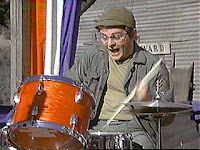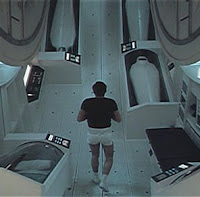 I have fond memories of watching a music video when I
was a lad of some old-timey diva-ish kind of jazz bar
song with this funny animated video and a magnificent
piano solo in the middle. What struck me particularly at
the time was that the video showed the innards of a piano
— the actual hammers hitting the actual strings
— as the solo was being played.
I have fond memories of watching a music video when I
was a lad of some old-timey diva-ish kind of jazz bar
song with this funny animated video and a magnificent
piano solo in the middle. What struck me particularly at
the time was that the video showed the innards of a piano
— the actual hammers hitting the actual strings
— as the solo was being played.
This song was ‘My Baby Just Cares For Me’ by Nina Simone. She had recorded the song back in 1958 but the video was from 1987: the single had been re-released after the track was used in a TV ad or something.
Whenever I hear the song I am struck by that great piano solo and I've long wanted to know more about the session musician they roped in to play it. I would have thought some faceless dude — who would have been paid a quick $15 to play on a timeless recording we're still listening to half a century later — deserved some fame. But the cool thing is — and I learned this only a couple of days ago — it was Simone herself who played it!
It turns out that her dream was to be the first black concert pianist and she only took up singing to continue to pay for her piano lessons. That's fabulous.
In 1966 she recorded ‘Lilac Wine’ which is, of course, a song now associated with Jeff Buckley. While many others have covered the tune, Buckley based his version on Simone's, saying of it “that's the only one that matters. That's the be all end all version. She's the king.”
One of the versions Buckley discounted was the 1953 recording of Eartha Kitt. Dubbed by Orson Welles as “the most exciting woman in the world,” Kitt, the Emmy-winning singer and actress, with her throaty voice and exotic looks was the Material Girl of her time. She reached her peak of hip groovihood, surely, when she guest-starred as Catwoman in the final season of the Batman TV series.
But the original Catwoman on the show — the
archetypical, the definitive, the greatest Catwoman —
was Julie Newmar and, if you'll excuse me, let's just have a
look at a photo of her:

Heaven help us all.
Newmar — not content with being stunningly gorgeous, not content with her strikingly high IQ, not content with her successful business dealings and property developments — has several patents in her name. One is a solution for that dreadful problem plaguing us all, being how to find pantyhose that'll flatten the stomach without flattening the bottom.
Newmar's leg coverings marketed as ‘Nudemar’ (“pantyhose with shaping band for cheeky derriere relief”) sold successfully through the 70s and 80s particularly after she herself modelled it in a revealing photo for People magazine.
There have been other celebrities with the inventor's bug: Jamie Lee Curtis invented nappies with pockets to hold baby wipes; Marlon Brando has the patent for a tool that adjusts the tension on skins of drums; Gary Burghoff brought the ‘fish attractor device’ into the world. I don't know what this device is — it's something to do with fishing, I presume. Fishing must have be one of his hobbies, along with the philately and jazz drumming.
There's an episode of MASH — in which Burghoff played
Radar O'Reilly — where he gets to play a drum solo. The
sound for it is not dubbed on which is the usual thing
directors do but you hear the actual performance Burghoff
did in front of the camera which is pretty cool. You've got to
enjoy seeing that sort of thing.

Burghoff was the only regular cast member of the TV series to have performed in the earlier Robert Altman MASH movie. Altman's film was released in 1970 and of the five Oscars it was nominated for that year, the category it won was Best Screenplay which amuses me as I'm not sure it had one: so much of the dialogue was improvised. Altman claims that MASH was the first major studio film to use the word “fuck” so there's one for your next trivia night. The cast included Donald Sutherland as Hawkeye and Elliot Gould as a cracking good Trapper and Sally Kellerman as Hot Lips.
Regular readers may know how much I love talking about Star Trek. Oh yes. You can't stop me going on and on about Star Trek, so here's some more for you: Gene Roddenberry made a pilot episode of Star Trek in 1964 called ‘The Cage’ but nobody picked it up so he made a second one called ‘Where No Man Has Gone Before’ which got the TV series into production. This episode featured the same Sally Kellerman playing a Starfleet psychiatrist who gets kidnapped by the baddie in the episode.
I've not seen this pilot but reading synopses of the thing make it seem twee and quaint. Here's some dialogue:
and so on. I don't think this would have won any Oscars for Best Screenplay.“You fools! Soon I'll squash you like insects!” — Mitchell (the baddie)
“Do you like what you see? Absolute power corrupting absolutely?” — Kirk to Kellerman's character.
“Hey, man, I remember you back at the Academy… a stack of books with legs!” — Mitchell to Kirk
This Mitchell character was played by Gary Lockwood who
is most famous for his role as Frank Poole in 2001: A
Space Odyssey. Lockwood's first scene in that film —
one of the movie's most famous (if not
one of cinematic history's most famous) — shows him
jogging through the ship's centrifuge, shadow boxing, to
keep in shape, while Kubrick has the soundtrack play a
lugubrious, dreamy cello piece from Khachaturian's ballet
Gayene — music evoking how slow and boring
the routine of months in space would be.

Aram Khachaturian was an Armenian composer, a contemporary of such people as Prokofiev and Shostakovich — writing honest, uplifting, Soviet music at Stalin's pleasure. His piano concerto is a real corker. Of all pieces in the piano repertoire it is my favourite to listen to. Keep your Bachs, your Beethovens, your Rachmaninoffs… this is my pick.
While I'm sharing, I'd say Shostakovich's fifth symphony would be my favourite orchestral piece. Some may say it is a clichéd choice but those people can get stuffed. It's solid gold. That march? Eerie and disturbing. The slow movement: heart-stopping. Play it at my funeral.
As Ian MacDonald pointed out in his book The New Shostakovich, Dmitri Shostakovich, while writing a symphony that would be easy listening for the Simple Russian People and cheery, good-willed stuff to make Stalin not want to have him tried as a traitor, left musical “coded messages” throughout the piece describing an oppressed soul raging against the tethers of the dictatorship.
Ian MacDonald's book, a controversial one when it was released due to its sudden, Western-friendly rewriting of the Shostakovich legacy, has now become the most trusted reading of the maestro's works. Another MacDonald book was a study of The Beatles' output and perhaps his fusion of writing and music was encouraged by his fellow students at Kings College, Cambridge when he was a lad. Among these fellow students he met at Kings were composers Andrew Davis and John Eliot Gardiner and writer Salman Rushdie.
Rushdie enjoyed both popular and critical success with his 1981 novel Midnight's Children winning that year's Booker prize, and in 1989 Ayatollah Khomeini went on radio in Iran, announced that Rushdie's book The Satanic Verses was blasphemous against Islam and proclaimed a fatwa requiring Rushdie's assasination. At least one attempt on Rushdie's life is believed to have occurred and today the fatwa has still not been lifted.
The most famous celebrity to have been condemned for what people took as his defence of the fatwa (he merely described the fatwa from the Islamic point of view — he was vehemently against applying it to Rushdie) was the singer-songwriter Cat Stevens. This guy somehow sold bucketloads of albums in the late 60s and early 70s: millions and millions of albums like his Tea for the Tillerman and the triple platinum Teaser and the Firecat were sold. The song ‘Katmandu’ from an earlier album (which sold a shipload) featured a 20-year-old Peter Gabriel playing the flute.
Gabriel had been playing for a number of years with a bunch of schoolfriends in a band he'd named Genesis and they were starting to earn some notice with their flamboyant stage costumes and unusual lighting and whatnot. By the mid-70s Gabriel was coping badly with being the leadman of the band and quit. The split inspired his song ‘Solsbury Hill’ (“my friends would think I was a nut”) which would be my favourite Peter Gabriel number.
Coming second would be ‘Sledgehammer’: great bass sound, the head-nodding outro lasting a good third of the song's running time, and of course the award-winning video clip produced by Peter Lord's company Aardman Animation.
This was back in the days before Lord hired Nick Park who brought the company all their Wallace and Gromit fame but after the success of the ‘Sledgehammer’ video Peter Lord and his team were commissioned to do a number of video clips including — 12 months after the Gabriel song — the 1987 re-release of Nina Simone's My Baby Just Cares For Me I was watching as a lad.
Thanks to YouTube, here it is:
I really enjoyed this post. It reminded me of my other favourite post, "Connections"
I can't take credit for knowing everything in this post. There needed to be a solid bit of research to get the thing together. And by “solid bit of research” I clearly mean “idle browsing and pointless googling”
Fluffy — Thank you very much!
Surely this is the basis of most "public awareness" campaigns run by we regular citizens these days?
And also, awesome post
Hoorah! Hoorah! Simply (or complexly) brilliant.
These Connections posts are such fun to write.
<< Home


